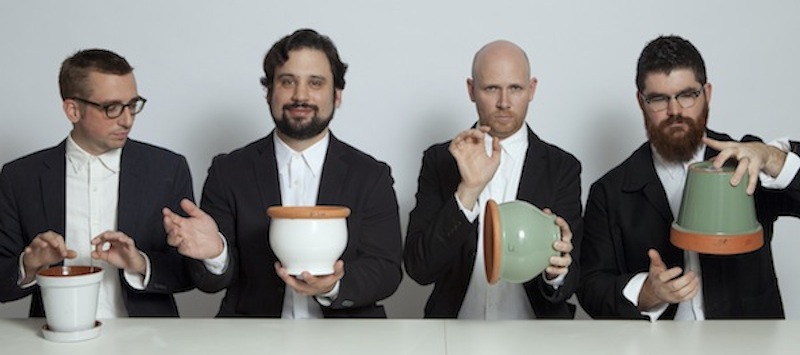A mixed night of percussion for a good cause at Carnegie Hall

Sō Percussion performed Thursday night at Zankel Hall. Photo: Janette Beckman
No one wants to throw a party without good music. It’s often the most important decision a host makes.
Thursday night, Carnegie Hall held a party for two of their philanthropic groups: Notables, and Notables Japan. Before the event, there was a concert celebration in Zankel Hall, and, good host that Carnegie Hall is, the venue brought in Sō Percussion to entertain the attendees. The Notables raise money for Carnegie’s Weill Music Institute, and the Institute in turn provides music education and community programs around New York City, the country, and across the globe (Ensemble Connect is one of their projects.)
The Notables are generally a young organization, and Sō Percussion was well chosen. The percussion ensemble is one of the leading groups of its kind and a linchpin in the indie-classical scene that brings together musical ideas—and musicians—from contemporary classical and rock and pop music.
The percussionists—Eric Cha-Beach, Josh Quillen, Adam Sliwinski, and Jason Treuting—came together with two guests—drummer and composer Bobby Previte and composer and guitarist Steven Mackey, in loose, genial performances of music full of rock and jazz inflections. More traditional contemporary compositions came from Andrea Mazzariello and Caroline Shaw.
Mazzariello’s Babybot was first. The title was descriptive of this witty, elegant piece; the instruments were small—miniature metallophones, tin cans—and the patterns were mechanical. They meshed like a finely made machine, with a repeated, descending minor key pattern alternating with well-shaped phrases for untuned percussion. Sō fit these two elements together with a relaxed sense of fun, and the piece and performance ended with a musical exclamation point.
Somewhere between slapstick and contemporary classical, lies Previte’s Terminal 4. The work shambled genially in and out of coherence like someone who’s had a little too much to drink but is still enjoying themselves. It started with a joke, then grew increasingly DaDa. Using only drumsticks, Sō began by beating out a rudimentary rhythm. Each player would accidentally lose a stick, scramble for it, then reach in their back pockets to pull out a replacement. Or two, or three, or five—like human clown cars, these guys kept pulling out the sticks, until there were so many that the piece collapsed into a pile of slivered wood.
Then Previte came out, sat at his drum kit, and started to play. The Sō percussionists moved to an array of hi-hats, and imitated Previte. This went on for a bit, then it all stopped while the musicians quickly set up another drum set. While this was going on, Previte, pulled off his sports jacket, tie, and dress shirt, leaving just a t-shirt.
There was a hint of a drum duet before Treuting hung a washboard around his neck, Previte picked up a pair of spoons, and they played. This then turned into a real piece of music, and an exciting one, with an involved drum duet from Treuting and Previte alternating with tuned percussion passages played by Cha-Beach.
Shaw’s Taxidermy was charming but also hermetic. The charm came from the instrumentation—ceramic flower pots—and the directness. The piece was all about rhythms, especially the contrast between simple and exact patterns and freer playing.
Then the players started speaking fragmented, repeated text about patterns and design. Whatever meaning this might have had, whatever point it was supposed to convey, was too distant from the music and any other context. Taxidermy was like a magic trick that never actually got to the payoff.
Mackey joined the percussionists for his Blue Notes and Other Clashes. An arrangement of a piece originally written for Sō and the PRISM saxophone quartet, this is packed with episodes of vital, colorful music. A lot of the appeal came through Mackey’s guitar work, which was full of microtones that were more uncanny than the usual “blue” notes, and made for an unusual and intriguing blend with the rest of his scoring.
With marimba, steelpan drums, and gongs, the music had a rich, chiming sound, something like a prog-rock gamelan. Mackey and Sō built a strong pulse and a good head of steam. Near the end, Mackey had some frustration with his amp, which Sō covered with a strong vamp and a Treuting drum solo. This was a party, after all, and nothing was going to spoil the fun.